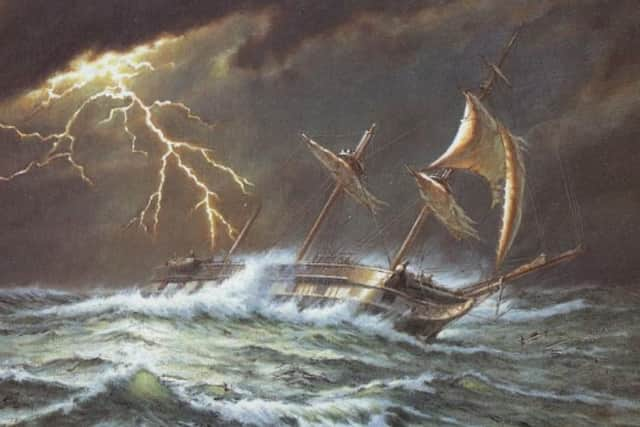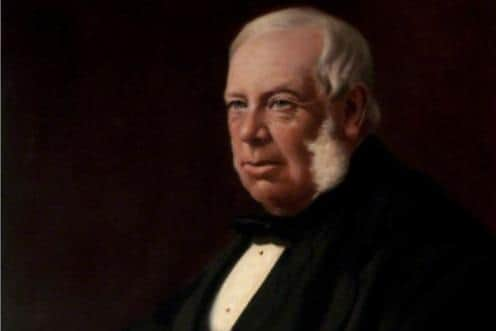The remarkable story of Boomhall resident James Corscaden who became first full US Consul for Derry
and live on Freeview channel 276
The fact that there were only 141 US consuls in the world at that time shows how important the booming emigrant port of Derry was to the emerging USA.
For 29 years he held the posts variously of consul, agent or vice-consul representing the USA in Derry, managing much of the diaspora that became Irish America.
Advertisement
Hide AdAdvertisement
Hide AdThe library of Congress holds his correspondence with the US Secretary of State, a treasure trove awaiting the attention of historians.


James rose from humble beginnings as the son of a grocer at the bottom of Shipquay Street.
Through partnerships with all the major shipping families in Derry such as the Munns, McCorkells, Cookes and Bairds, he became a wealthy merchant transporting emigrants and linen and trading timber and flax seed by return between Derry, New York, Quebec, Savannah Georgia, Philadelphia, New Brunswick and occasionally the Bahamas.
It was a business fraught with risk. His ship the Erin foundered off Abaco in the Bahamas in 1842 when it went in search of a return cargo of rum after delivering emigrants to the USA.
Advertisement
Hide AdAdvertisement
Hide AdIn December 1848 his Creole was struck by lightning on a trip from Derry to Philadelphia losing two thirds of her sails and main and mizzen masts requiring a limp to Cork for repairs.


As a tireless advocate for the flourishing Victorian city of Derry, James was a prime mover in the Londonderry Gas Company and The Lough Swilly Railway Company.
He owned over ten ships built as far afield as New Brunswick, the eastern Canadian province, and he fought hard to create a shipbuilding industry in the Pennyburn area in order to make Derry port as self-sufficient as possible and to multiply the wealth the port brought to the city.
He saw the building of railways as an important way to develop the port and fought many battles to prevent Belfast interests from diverting the railways and trade away from Derry port. Nothing changes it seems.
Advertisement
Hide AdAdvertisement
Hide AdAs US Consul, his job was to make sure that people emigrating to the US were healthy and able to sustain themselves when they arrived.


In 1830s America fear of cholera brought in by immigrants had reached fever pitch, causing riots against immigrants in Philadelphia.
His offices in 20 London Street and 29 Shipquay Street were like the US customs office in Shannon, providing paperwork which allowed emigrants to step off the boat at Philadelphia with minimal checks because he had certified them as fit upon leaving Ireland.
Through the extensive network of Ulster merchants who had emigrated to Philadelphia, New York and Canada in the 1700s he sought not only to transport people to America but to find them employment when they got there.
Advertisement
Hide AdAdvertisement
Hide AdIndeed, Derry was said to be the leading city in Ireland and Britain dealing with pre-paid passages from sponsors such as DuPont who paid immigrants from Derry, Tyrone and Donegal to work in their gunpowder works in Brandywine, Wilmington, Delaware in the 1820s and 30s.
The good experience DuPont had with workers from the North West in the nineteenth century no doubt was a persuasive factor in DuPont eventually deciding to locate its European base at Maydown in the twentieth century.
Corscaden was the main agent in Derry to recruit these workers such as Bernard and Biddy McIlheaney from Donegal who sailed on the John Stamp to Philadelphia by arrangement with Corscaden in April 1832 on a ticket pre-paid by DuPont.
A few months later a young John Ruddy from Donegal was not so lucky when he also left on the John Stamp with Corscadden as agent and was immediately employed by a contractor John Duffy in Philadelphia to build a railway siding.
Advertisement
Hide AdAdvertisement
Hide AdWithin six weeks he and fifty-six other Irish labourers mysteriously died in one night, supposedly from an outbreak of cholera at their work camp.
Historians now believe that he and his workmates were clubbed to death and shot by local vigilantes at the now notorious ‘Duffy’s Cut’, because of paranoia about Irish immigrants bringing cholera to their valley. His body was only recently returned and buried in Ardara.
James married Frances Gallagher the daughter of William Gallagher of Ballyarnett and they had five sons and two daughters. Sometime after 1881 James moved from his residence in Ballyarnett House to Boomhall.
Due to complications regarding the transfer of land from the Gallaghers he fell into dispute with his son and had to move house after losing his court case against him.
Advertisement
Hide AdAdvertisement
Hide AdFortunately, his business partners, the Cookes, were able to lease Boomhall to him. In 1888 he died of pneumonia after walking home to Boomhall in the rain from Waterloo Place.
A hundred and ten carriages gathered at Boomhall for his funeral and lined the avenues down to the house before following the hearse drawn by four black horses through the town to the City Cemetery where he now lies in the Corscaden mausoleum overlooking the city which he had championed on the world stage all his life.
This article was authored by Bart O’Donnell of the Boomhall Trust, a Charitable Trust dedicated to the purpose of conserving and restoring the estate of Boomhall for public benefit. For more information about the charity and its mission visit the https://boomhall.org/ website.